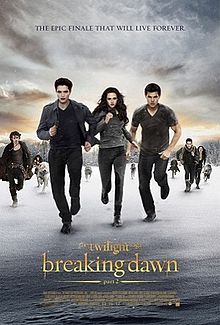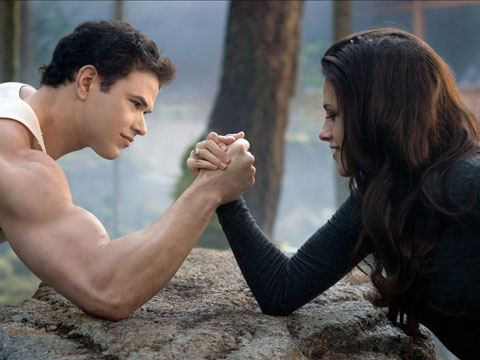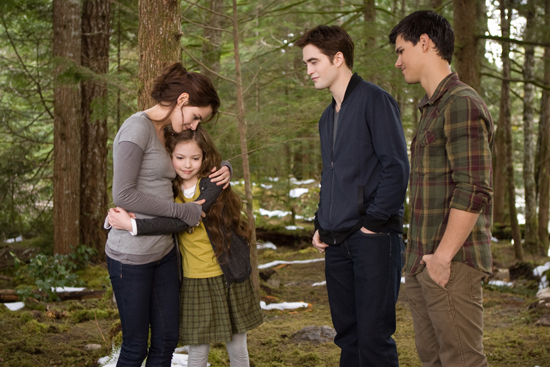 As I write my fourth, and final review of Stephanie Meyer’s Twilight series, I wonder how I ever got sucked into (forgive the pun) reading/viewing a book about vampires. It happened when my sister-in-law, who knew that I wrote books about adolescent romance, recommended Twilight. “The characters in the book don’t believe in having sex until marriage,” she marveled. A book about teenagers waiting to have sex that was actually popular? That piqued my interest.
As I write my fourth, and final review of Stephanie Meyer’s Twilight series, I wonder how I ever got sucked into (forgive the pun) reading/viewing a book about vampires. It happened when my sister-in-law, who knew that I wrote books about adolescent romance, recommended Twilight. “The characters in the book don’t believe in having sex until marriage,” she marveled. A book about teenagers waiting to have sex that was actually popular? That piqued my interest.
Meyer delivered as my sister-in-law had promised. Her characters do, indeed, wait until marriage to have sex. However, my hopes for a model young adult novel were dashed when I recognized that, although characters Bella and Edward did not succumb to physical intimacy, they wallowed deep in the throws of emotional intimacy. Therefore, it came as no surprise that the only way Meyer could keep her characters chaste was to have them marry as soon as Bella graduated from high school. That made me cringe.
Even though Bella acknowledges that she never planned to marry so young, and fears her parents will each have a stroke when they learn she will forgo college, she nevertheless abandons her previous goals and gives in to her emotions. The implication, not implication–brash, brazen, bold message–is that she has found the love of the ages. Her love is so profound, so deep, so unique, so special that it hasn’t been matched in the history of mankind. Therefore, she is justified in her desire to give up everything (even her life) to be with her beloved Edward.


This message not only makes me want to gag, it scares me. This is the very myth that adolescent girls want to believe is true. They are romantics by virtue of their DNA. They fall in love easily. They love deeply. And they want to believe that their love was ordained in the pre-existence, and they have found their perfect match. This is precisely why the Twilight series became so wildly popular. It fulfilled a young girl’s most elaborate fantasies.
Girls who can remember that this series is above all fantasy, probably won’t be unduly harmed. However, those who imagine their high school crush could blossom into a Twilightesque love affair are at serious risk. They may not fall in love with a boy who is as much a gentleman as Edward, and when the object of their passion fails to exercise self-restraint, they will be in no position to restrain him.
The risk of premarital sex is nerve-wracking enough, but of even greater concern is the young girl who actually marries who she thinks is the man of her dreams, and they become a statistic: one of the 95% of high school sweethearts who don’t make it.
The idea that sex should be saved for marriage could potentially redeem this series, however the message that high school romance is guaranteed to lead to bliss beyond compare is dangerous enough to negate the redemption.
Breaking Dawn part two, does, however, purport additional ideas that young girls would do well to internalize. I don’t believe these messages are enough to recommend the movie, but if anybody insists on seeing it, at least they can glean some wheat from the chaff.
Kristen Stewart’s best performance of the entire series occurs when she discovers Jacob has “imprinted” on her daughter. Her character Bella, who for most of the series has been a clumsy, insecure, timid teenager, in dire need of a knight in shining armor, finally stands up for herself. It is absolutely hysterical to see Bella castigate Jacob, as if he is some kind of a pervert.


Immediately thereafter we see Bella racing her lightening-fast husband, and keeping up with him every step. Then she arm wrestles her hulky brother-in-law and beats him! And she is quite content to brag about her victory. The strength she receives as a “newborn” vampire is symbolic of the strength a young woman has when she develops self-confidence, and she no longer needs a man to make her feel worthwhile. Bella truly has evolved, not just physically, but emotionally. She is capable and she knows it. Quite the contrast considering at one point in her life she could find no reason to live without her man.
In real life it is nice to see young girls who discover they don’t need a man to be of worth. It is delightful to see them have confidence, and “keep up” with men, even if it is not physically, but emotionally. I don’t know if audiences will be able to take inspiration from Bella’s transformation, however, because Bella became confident when she became a vampire, and the girls who watch this, simply don’t have that opportunity. They will have to find ways of their own to gain confidence. But it sure is inspiring to see the contrast, and I can’t imagine young girls would want to be the Bella of book one when they could aspire to be the Bella of book three.
The theme of “family first” also continues throughout this movie, as it did in the previous one. Edward admits he would not ask his fellow vampires to risk their lives were it not to save his family. Again, a young girl’s fantasy to have her knight in shining armor also be a family man is epitomized in this character. It is really isn’t surprising the series has been so wildly popular.
Fans who have been eagerly waiting to discover Bella’s special “power” as a vampire won’t be disappointed when it is revealed. Who hasn’t dreamed of being Superman, or Spiderman, or Captain America? Who hasn’t fantasized about being one of the X-men, and speculating about which power one would prefer. Bella, too, wonders what power she will have as a vampire. At first she believes it is the gift of excessive self-control (which wouldn’t be a bad gift for teenagers to aspire to attain). Then she discovers that in addition to self-control, she has the ultimate gift, the gift that every estrogen flooded woman would relish–the ability to protect those she loves from harm. Perhaps this is one reason the stories are so popular even with adult women. What mother wouldn’t want to protect her children from evil–physical and spiritual?
Tragically, audiences can barely appreciate the magnitude of this gift, as the movie, Breaking Dawn part two, was sensationalized for the big screen. In the book Bella protects her loved ones from evil by blocking the special powers of her enemies. Their safety is entirely due to her special power. There is no violence. There is no battle. The enemy simply goes away when they discover they have no power when Bella is present. (There has to be some intentional symbolism here.) One huge drawback of the movie version is the tremendously violent battle, that although it doesn’t “really” occur, still puts violent images in the viewer’s head.
Ironically, this battle scene, that was doubtless added to make the movie a commercial success, made absolutely no sense to my compliant husband who has seen/read nothing of the Twilight series save this movie.
In fact, hardly anything in the movie made sense to him. It’s likely that anybody who hasn’t read the books, or seen the first three movies will be totally lost in Breaking Dawn, part two.
JeaNette Goates Smith is the author of Unsteady Dating: Resisting the Rush to Romance, available at www.unsteadydating.com and also Unsteady Dating: What Every Parent Absolutely Must Know About Teenage Romance available at www.amazon.com

















